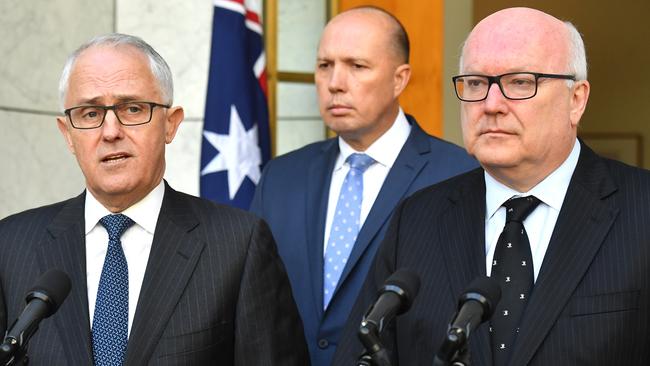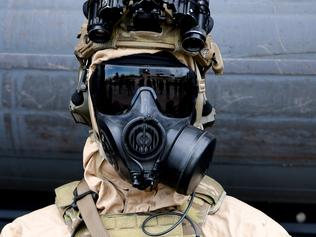Aussie terrorist exposes YouTube extremism
The most senior Australian terrorist is attracting thousands of viewers on YouTube each week.

The most senior Australian terrorist has produced is attracting thousands of viewers on YouTube each week, telling them he joined al-Qa’ida in Syria because his Australian passport was cancelled.
Amid international debate about the role new media companies have to stop terrorists from spreading their messages, former Sydney cleric Mostafa Mahamed, who is on a US kill list, has been filmed for up to an hour at a time in Syria as part of a month-long series of Q&A-style YouTube videos.
Malcolm Turnbull and Bill Shorten will today call for action to protect Australians against radical Islamic terrorists using cyber tools to radicalise young Australians and threaten national security.
The Prime Minister, in a statement to parliament, will reaffirm his commitment to an “online civil society”.
The Opposition Leader describes the fight against terrorism as a “21st-century conflict”, being “fought online as well as in the streets”, and says tech companies “have the resources and the capacity to do more”.
Mahamed, a 33-year-old Egyptian-born terrorist, is subject to sanctions in Australia and the US after being declared a “specially designated global terrorist” — but claims to have quit the terror group last year. He had been a spokesman and senior official.
Contacted about the videos, a spokesman for Google, which owns YouTube, said the company wanted to rid the platform of terrorist voices but was unable to say whether these clips would be deleted.
“We never want terrorists to have a voice, or spread extremist material on our services and we take our role in tackling extremism online very seriously,” he said.
“We are working urgently to further improve how we deal with content that violates our policies and the law.
“These are complicated and challenging problems, but we are committed to doing better and being part of a lasting solution.”
In his most recent video, which has been watched more than 2000 times since it was uploaded on Saturday, Mahamed links the cancelling of his Australian passport — which was done 40 days after he entered Syria in 2012 — to his decision to join al-Qa’ida’s Syrian branch, then known as Jabhat al-Nusra.
“My family back home received a letter saying that my passport was cancelled and I was no longer in a position to travel with my Australian documents,” he tells freelance journalist Bilal Abdul Kareem in the video.
“So I was in a very difficult situation and I had to make a decision as to what I was going to do then. It wasn’t possible just to pick up and leave. I was given an opportunity to perform an obligation that I still believe is extremely important to realise, for every Muslim, that it is obligatory when faced with a situation to offer your services to the weak, to the oppressed.”
He then went on to describe meeting with the “top leaders of Jabhat al-Nusra — the head honchos”, in which he agreed to join the group after being told they did not kill innocent civilians. He has said recently he condemned the killing of innocent civilians, saying last week’s attacks in Melbourne and London and the September 11, 2001, attacks could not be justified. This is despite him celebrating the anniversary of the World Trade Centre attack on Twitter in 2014.
“On this day, in 2001, the USA’s largest economic shrine, the idol of capitalism, was brought to the ground. the toll of injustice (sic) is hefty,” he wrote on Twitter in 2014.
He had fought under the nom de guerre Abu Sulayman and was once sent by al-Qa’ida to negotiate a truce with Islamic State leader Abu Bakr al-Baghdadi.
The Prime Minister will tell parliament today that the Attorney-General, George Brandis, will travel to Canada this month to meet with his counterparts in the Five Eyes intelligence-sharing community and discuss what more can be done “among our like-minded nations and with the communications and technology industry, to ensure terrorists and organised criminals are not able to operate with impunity within ungoverned digital spaces”.
The Opposition Leader will say: “Terrorists are using sophisticated online strategies as well as crude weapons of violence. That’s where the private sector also has a responsibility. For a long time, Daesh has used the internet as an instrument of radicalisation.
“Through Twitter and Facebook they boast of a propaganda arm that can reach into every home in the world: spreading hate, recruiting followers and encouraging imitators.”
Mr Turnbull’s adviser on cyber security, Alistair MacGibbon, backed the push obliging tech companies to do more to help crime and terrorism investigators. He said the rise in encryption technology had been a boon for consumers and businesses, but there was a case for “very surgical’’ powers that would force companies such as Apple to do whatever they could to help police retrieve information locked on encrypted devices.
“It’s a very surgical, very oversighted used of force, essentially,’’ Mr MacGibbon said of the push, which was been endorsed by British Prime Minister Theresa May after the London Bridge attack.
“It requires, occasionally, that the interests of public safety override the quite proper and normally protected privacy of an individual,’’ he said.
Additional reporting: Paul Maley



To join the conversation, please log in. Don't have an account? Register
Join the conversation, you are commenting as Logout